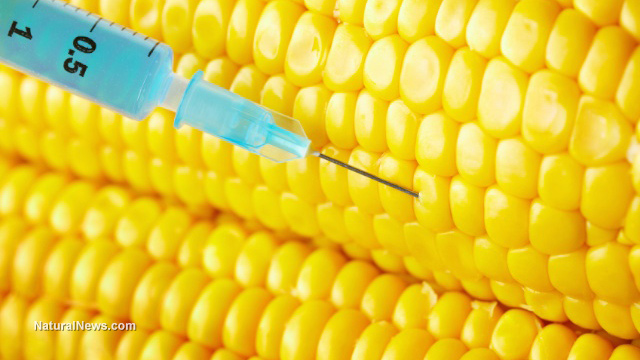Trading giant Cargill sues Syngenta over lost profits due to unapproved GM corn
Tuesday, September 23, 2014 by: PF Louis
Tags: GMOs, GM corn, Cargill

- Newly released JFK files reveal Pentagon's role in creating Lyme disease and covid in the same lab
- Dr. Suzanne Humphries makes bombshell appearance on Joe Rogan podcast, exposing vaccine industry deception back to POLIOMYELITIS
- L.A.'s rebuilding nightmare: Only 4 permits issued after fire destroys 6,000 homes
- Discovery of vast underground city beneath Giza pyramids challenges human history
- Black cumin seed oil emerges as a powerful ally against breast cancer and chronic inflammation
- “Independent” anti-Russia outlet MEDUZA faces COLLAPSE as US funding dries up
- Catastrophic 7.7 earthquake devastates Myanmar and Thailand; death toll could reach 100,000
- The hidden battle in your glass: How A1 and A2 milk could shape your health
- AI breakthrough slashes celiac disease diagnosis time from months to minutes
- BPA: The hidden hormone disruptor sabotaging your health - and how to fight back
- Sugar-free deception: Artificial sweeteners hijack hunger signals, fuel obesity epidemic, study warns
- Europe braces for WAR as EU urges citizens to STOCKPILE FOOD, in latest provocations with Russia
- Putin vows to 'finish off' Ukraine, accuses West of prolonging the war
- Thomas Massie’s Dual Loyalty Disclosure Act aims to restore American sovereignty by cracking down on foreign influence in Congress
- Aluminum pollution: A silent threat to human health
- Tesla owners under siege: Road rage, vandalism and political backlash fuel fear among drivers nationwide
- Chaos in Amsterdam: Five injured in broad daylight knife attack near Dam Square
- "Feel G.O.O.D. Gut Health Program" on BrightU: Dr. Basima Williams introduces the Feel-Good Plate Method
- Newly released JFK files reveal Pentagon's role in creating Lyme disease and covid in the same lab
- Analysis: The coming economic collapse, a mass uprising and Trump's three secret weapons to halt the growing revolt
- Festive flavors: The sweet history, nutritional profile and health benefits of pecan pie
- Elon Musk: Aliens could be here on Earth RIGHT NOW
- Trump reverses course on Gaza plan, says “nobody is expelling Palestinians”
- Big Pharma's $8 Billion bribery scheme exposed: how doctors are pushed to prescribe junk science, not heal
- Boys are back in town: Trump’s patriotic alpha crew takes the wheel while toxic females ride in the backseat
- Reclaim your health: How midlife exercise reverses years of inactivity
- A lack of integrity in Academia: Harvard professor found GUILTY of fraudulent research to promote CRT theory
- Survival 101: Effective EMF blocking techniques
- EPA advisor admits the agency is funneling billions to climate groups ahead of Trump’s return to White House
- Dr. Mike Yeadon releases 15-minute testimony - WATCH - about genocidal intent of COVID “vaccines”
- 5 Simple steps to boost your brainpower: How to strengthen executive function in a distracted world
- Florida takes a stand: DeSantis proposes permanent ban on mRNA vaccine mandates
- Sugarcane extract superior to cholesterol-lowering drugs?
- Mike Adams Sermon 66: God will DESTROY ISRAEL for its wickedness
- Pilots report mysterious lights 'moving at extreme speeds' across Oregon skies
- Space war brewing? Russia threatens to destroy Starlink satellites
- EPA advisor admits the agency is funneling billions to climate groups ahead of Trump’s return to White House
- California's social media censorship law struck down: A victory for free speech or a threat to online safety?
- The Health Ranger releases “Vaccine Zombie” song and music video, using AI-animated zombies for the music video
- Dr. Mike Yeadon releases 15-minute testimony - WATCH - about genocidal intent of COVID “vaccines”
- The pandemic as a tool for INDOCTRINATION: Understanding “The Indoctrinated Brain” by Dr. Michael Nehls
- Newly released JFK files reveal Pentagon's role in creating Lyme disease and covid in the same lab
- Florida takes a stand: DeSantis proposes permanent ban on mRNA vaccine mandates
- Mike Adams releases country western hit single: Goin’ Back in Time is Comin’ Home
- Mike Adams releases music poetry sensation: A Child of God
- “Why we influenced the 2020 elections”: Facebook files reveal the coordinated effort to bury the Hunter Biden laptop story
- Unpacking the Lies That We’ve Been Fed – new song and music video released by Mike Adams, the Health Ranger
- RFK Jr. clears key hurdle: Sen. Susan Collins backs controversial HHS nominee, signaling a new era for health policy
- Mike Adams releases new song and music video: Nothing More Disgusting Than a Globalist
- Michigan sheriff announces criminal investigation into 2020 election crimes, Dominion Voting Systems
- Israeli soldiers accused of even more torture and abuse in the West Bank
- Migrants are taking advantage of recent hurricanes to scam residents and loot their homes
- House Intelligence Committee calls for the ARREST and PROSECUTION of Dr. Anthony Fauci
- Rep. Nancy Mace introduces bill to ban biological males from female facilities on federal property
- Red Cross issues warning to stop blood plasma donations from vaccinated people
- Scientists confirm: GENIUS brain function can be spontaneously unleashed in humans without any apparent cause
- EPA advisor admits the agency is funneling billions to climate groups ahead of Trump’s return to White House
- HYSSOP: What research reveals about the health benefits of this ancient holy herb
- Two containers with completed ballots fall out of truck in Florida
- Fully vaccinated about to see “tsunami” of illness and death, warns virologist
- Global leaders unite to clamp down on “misinformation” with UN-backed Cascais Declaration
- BREAKING: 2025 NDAA authorizes mandatory military draft of WOMEN across America… as Pentagon pursues global NUCLEAR war with both Russia and China at the same time
- Michael Yon warns of a ZIONIST TAKEOVER in Trump’s second administration
- BOMBSHELL: DNA testing kits are a SCAM to develop ethnic-specific bioweapons
- Ozempic and Wegovy weight loss drugs are injectable LIZARD VENOM PEPTIDES that may unleash a devastating wave of organ failure… side effects align with symptoms of SNAKE BITES
- Israeli soldiers accused of even more torture and abuse in the West Bank
- These 13 countries just signed an agreement to engineer a global FAMINE by destroying food supply
- NASA admits that climate change occurs because of changes in Earth’s solar orbit, and NOT because of SUVs and fossil fuels
- RFK Jr. clears key hurdle: Sen. Susan Collins backs controversial HHS nominee, signaling a new era for health policy
- Sermon 30: How Jesus reveals Caesar’s FAKE CURRENCY and FALSE AUTHORITY
- Coriander seeds: Ancient medicine backed by modern science
- Arizona officials claim Maricopa County needs 10-13 days to tabulate results of the election
Cargill is in the food-trading business purely for control and profit, and they are pro-GMO, of course. Nutritional quality is of no concern. But they don't like it when their export sales are spoiled by a GMO company's effort to insert their corn product into a large shipment exported by Cargill to China, a nation that hasn't approved it.
The corn was from Syngenta's Agrisure Viptera (MIR162) seed, which was approved for cultivation in the United States in 2010. But the Chinese government had not approved this genetic strain. Earlier, China had declared GMOs safe and acceptable and became the target of GMO producers and grain traders, especially Cargill.
But the mood in China has been changing since then. In August of 2014, China's Ministry of Agriculture refused to renew certificates that allowed Chinese research groups to grow genetically modified rice and corn. China also refuses to import foods with genetic modifications not approved by the government.
Cargill says that, since November 2013, China's Ministry of Agriculture has refused more than 1.4 million metric tons of corn after finding traces of Viptera on corn-carrying ships. Cargill has filed a $90 million suit for damages from the rejections.
It doesn't seem like much among multi-billion-dollar multinationals and their billionaire owners. But that's only because the shipments rejected by China were diverted by Cargill to other ports where they were accepted. Observers feel that Cargill is imposing a punishment on Switzerland-based Syngenta for poor business conduct, basically being sneaky with their products.
Mark Stonacek, president of Cargill's grain and oilseed supply chain in North America, announced:
"Unlike other seed companies, Syngenta has not practiced responsible stewardship by broadly commercializing a new product before receiving approval from a key export market like China. Syngenta also put the ability of U.S. agriculture to serve global markets at risk, costing both Cargill and the entire U.S. agricultural industry significant damages."
Syngenta claims that the suit has no merit. But wouldn't it be nice if the Big Ag companies and GMO seed producers got involved with more conflicts among each other?
There are other incidents of food exports rejected because of GMO contamination
The worldwide effort by GMO seed companies to control all the planet's food has come across a shrinking market lately. There has been growing resistance to these GMO multinationals in Europe, South America, Mexico, Africa, Japan, South Korea, China and Russia, which gave a blanket nyet to GMOs in a very big way.Now China refuses to accept dried distillers' grains, which are known in the industry as DDGS, a byproduct of corn used to manufacture ethanol. The Chinese government has declared them to have a high risk of MIR162 contamination potential.
Several US wheat farmers found their export trade hampered from Monsanto's contamination of their crops during field trials conducted in an effort to gain USDA approval. The approval never happened, but several non-GMO fields were contaminated, causing their exports to be rejected.
So far, there are no approvals for GM wheat. This means GM wheat is illegal, and instead of Monsanto having the legal ammunition to tyrannically sue farmers for patent infringements after their crops were involuntary contaminated from GMOs, now the worm turns.
The wheat farmers can go after Monsanto for its negligence to obtain damages legally. Because GM wheat is not legally sanctioned, even if Monsanto has the patent, they are now vulnerable for damages instead of having the legal upper hand to victimize the farmers with patent infringements after their fields are contaminated.
Japan and South Korea have nixed shipments of wheat from the USA because of GMO contamination concerns. Once GMO contamination is discovered in grain imports, that market becomes less inclined to have GMOs pushed on them or accept products from GMO exporters.
A shrinking GMO market is a good thing for the world. So far, America is too dumbed down and corrupt to help shrink that market in its own yard.
Sources for this article include:
http://archive.fortune.com
http://www.reuters.com
http://www.startribune.com
http://www.naturalnews.com
http://www.naturalnews.com
http://www.naturalnews.com
http://science.naturalnews.com
GMOs at FETCH.news
Get independent news alerts on natural cures, food lab tests, cannabis medicine, science, robotics, drones, privacy and more.
More news on GMOs
Take Action: Support Natural News by linking to this article from your website
Permalink to this article:
Embed article link: (copy HTML code below):
Reprinting this article:
Non-commercial use OK, cite NaturalNews.com with clickable link.
Follow Natural News on Facebook, Twitter, Google Plus, and Pinterest
Science News & Studies
Medicine News and Information
Food News & Studies
Health News & Studies
Herbs News & Information
Pollution News & Studies
Cancer News & Studies
Climate News & Studies
Survival News & Information
Gear News & Information
News covering technology, stocks, hackers, and more



"Big Tech and mainstream media are constantly trying to silence the independent voices that dare to bring you the truth about toxic food ingredients, dangerous medications and the failed, fraudulent science of the profit-driven medical establishment.
Email is one of the best ways to make sure you stay informed, without the censorship of the tech giants (Google, Apple, Facebook, Twitter, YouTube, etc.). Stay informed and you'll even likely learn information that may help save your own life."
–The Health Ranger, Mike Adams













































